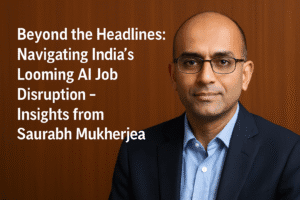Beyond the Headlines: Navigating India’s Looming AI Job Disruption – Insights from Saurabh Mukherjea
Saurabh Mukherjea sounds a profound alarm: AI threatens 40 million middle-class Indian jobs by automating repetitive knowledge work—coding, underwriting, equity research, and HR tasks. Unlike aging economies needing AI to fill labor gaps, India faces severe disruption because its service-led growth relies heavily on precisely these automatable roles.
Crucially, Mukherjea admits even his role isn’t safe, forcing him to personally pivot towards irreplaceably human skills: writing books, building businesses, and strategic speaking. His survival blueprint highlights the critical shift needed—from executing routine processes towards creativity, entrepreneurship, and complex human interaction.
This demands urgent workforce upskilling beyond technical tasks, an education revolution fostering adaptability, and proactive policies supporting massive reskilling. India’s next decade hinges on cultivating uniquely human strengths AI cannot replicate: empathy, ethical judgment, and visionary innovation. Complacency is not an option; strategic adaptation is essential.

Beyond the Headlines: Navigating India’s Looming AI Job Disruption – Insights from Saurabh Mukherjea
The stark warning from Saurabh Mukherjea, founder of Marcellus Investment Managers, cuts through the usual tech optimism: “AI is coming for 40 million Indian middle-class jobs.” This isn’t a distant sci-fi scenario, but an imminent economic challenge he terms “probably the defining challenge for India over the next 10 years.” What makes this pronouncement particularly resonant is Mukherjea’s candid admission: “even he’s not safe.”
Why the Alarm Bell Rings Loudest in India
While AI adoption might ease labour shortages in aging economies like Europe and Japan, Mukherjea argues India faces a uniquely severe risk. The core vulnerability lies in the structure of India’s service-led growth engine:
- The Repetitive Knowledge Work Trap: India’s middle-class success, particularly in sectors like IT services, has been built on mastering complex but ultimately repetitive tasks – coding, financial modelling, credit underwriting, large-cap equity research, and basic HR operations. Mukherjea’s chillingly simple calculus: “Anything which is repetitive… AI will do it cheaper. It’s guaranteed.”
- Scale of Impact: The sheer number – 40 million jobs – represents a massive swathe of the aspirational middle class. This isn’t just low-skilled labour displacement; it’s the automation of the very white-collar professions that powered India’s economic rise.
Mukherjea’s Personal Playbook: Adapting to Stay Relevant
The most compelling insight isn’t just the warning, but Mukherjea’s personal response. He isn’t waiting; he’s actively reshaping his own role to stay ahead of the AI wave. His strategy focuses intensely on non-automatable human skills:
- Creativity & Original Thought: Writing books demands unique perspectives and synthesis beyond data crunching.
- Entrepreneurial Vision: Building new businesses requires spotting opportunities, navigating uncertainty, and driving innovation – areas AI struggles with.
- Persuasion & Influence: Speaking at global forums relies on human connection, storytelling, and adapting messages to live audiences.
- Strategic Exploration: Identifying and entering new markets involves nuanced cultural understanding, relationship building, and intuitive risk assessment.
“The only relevance people like me will have is doing what AI can’t,” he stated bluntly. This is his blueprint for survival in the AI era.
Beyond Automation: The Human Edge in the AI Economy
Mukherjea’s personal pivot highlights the critical skills that will define value in the future workforce. AI excels at pattern recognition, data processing, and executing defined procedures at superhuman speed and scale. Humans, however, retain crucial advantages:
- Complex Problem Solving & Strategy: Tackling ambiguous, multi-faceted problems without clear rules.
- Empathy & Emotional Intelligence: Building trust, understanding nuanced human needs, managing teams, and navigating sensitive interpersonal dynamics (beyond basic HR functions).
- Creativity & Innovation: Generating truly novel ideas, artistic expression, and disruptive thinking.
- Ethical Judgment & Context: Making decisions involving values, morality, and understanding complex social and cultural contexts.
- Entrepreneurship & Vision: Seeing the bigger picture, taking calculated risks, and building something new.
India’s Imperative: A Workforce and Policy Reset
Mukherjea’s warning, coming from a respected figure in finance known for long-term thinking, underscores the urgency. Relying on the old service-sector playbook is unsustainable. The response must be multi-pronged:
- Individual Upskilling: Professionals must proactively move beyond repetitive tasks. Focus on developing creativity, critical thinking, leadership, emotional intelligence, and domain expertise combined with AI literacy. Lifelong learning isn’t optional.
- Educational Revolution: The curriculum, from schools to universities, needs a fundamental shift away from rote learning towards fostering creativity, complex problem-solving, and adaptability. STEM + Humanities integration becomes vital.
- Policy Focus: Government initiatives must prioritize reskilling/upskilling at massive scale, encourage entrepreneurship in AI-resistant fields (care, creative industries, complex services), and potentially explore social safety nets during the transition.
- Corporate Responsibility: Businesses need to invest heavily in employee transition, focusing on augmenting human capabilities with AI rather than purely replacing roles.
Saurabh Mukherjea‘s message is not about inevitable doom, but about urgent and necessary evolution. The AI wave will reshape India’s job landscape profoundly. The 40 million figure is a stark projection of risk, not destiny. The defining factor for India’s success over the next decade will be how swiftly and effectively its workforce, educators, businesses, and policymakers can pivot towards cultivating and valuing the irreplaceably human skills that AI cannot replicate. The time for complacency is over; the era of strategic adaptation and embracing uniquely human potential has begun.
You must be logged in to post a comment.